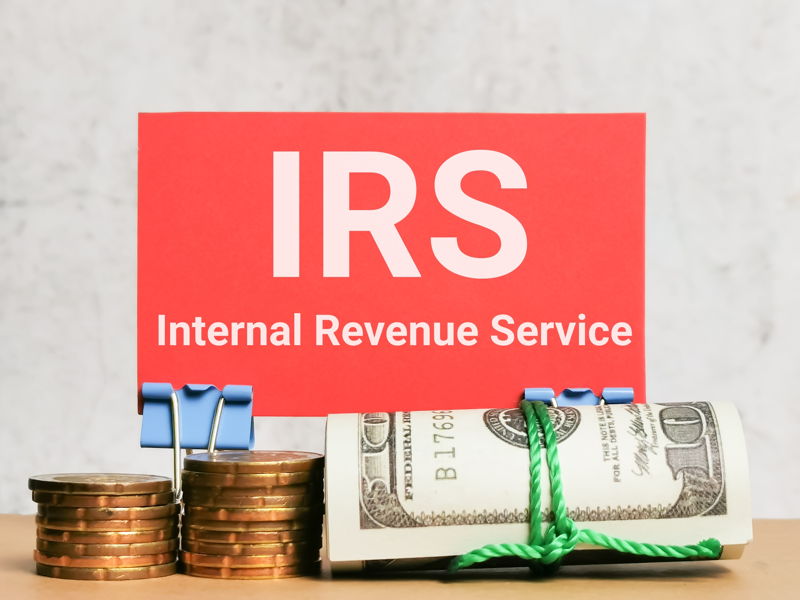The Internal Revenue Service (IRS) audited 582,944 tax returns, recommending an astonishing $31.9 billion in additional taxes recently. These aren’t just numbers—they could represent someone just like you, facing unexpected financial strain due to an IRS audit.
Are you worried about being next? If the possibility of an IRS audit looms over you, know exactly what to expect and how to handle the situation. This blog is your one-stop solution to understanding more in detail about IRS audits, guiding you through every step of the process, from the initial notice to the final resolution.
So, let’s get started.
What is an IRS Audit?
An IRS audit is a governmental examination of an individual’s or organization’s financial records to confirm that tax information has been reported accurately and that the correct amount of tax has been paid according to tax laws.
How do you know if you’re being Audited?
Being selected for an IRS audit doesn’t necessarily mean there’s an issue with your tax return. Here’s a simple breakdown of why you might be chosen for an audit:
- Random Selection and Computer Screening: The IRS uses statistical formulas to pick audited returns. Your tax return might just randomly match up against certain “norms” established from earlier audits of similar tax returns. This selection process is part of the IRS’s National Research Program, which helps update their methods for choosing returns to audit.
- Related Examinations: Your tax return might also be selected if it includes transactions or links with other taxpayers who are being audited, like business partners or investors.
Once your return is selected, an experienced auditor will review it. They might simply approve it, or if something looks off, they’ll mark those issues and send the return to an examination group for a more detailed review.
Important Notes
- Filing an amended return doesn’t influence whether your original return is selected for an audit. However, just like original returns, amended returns are also screened and could be chosen for an audit.
- Receiving a refund from the IRS doesn’t automatically trigger an audit.
Understanding these factors can help you see why you might be audited and alleviate concerns about the selection process.
Other reasons may include:
To understand when you get audited by the IRS, consider the following reasons:
- High Income: More money often means more complex tax situations, which can lead to audits.
- Large Charitable Deductions: Very high donations compared to your income might look suspicious.
- Unusually High Deductions: If your deductions are much higher than typical for your income, it could raise questions.
- Errors on Your Tax Form: Mistakes like wrong numbers or math errors can trigger an audit.
- Foreign Income: Not reporting money from outside the U.S. can attract IRS attention.
- Cash Businesses: Businesses dealing mostly in cash, like cafes or salons, are often audited more.
- Home Office Claims: Claiming a part of your home as an office has strict rules and can be scrutinized.
- Hobby Losses: Reporting losses from activities that seem more like hobbies than businesses can lead to an audit.
If your account is being selected for audit for any of the given reasons, the IRS will notify you by email.
What happens during a Tax Audit?
If you’re selected for an IRS audit, here’s how it will typically be conducted:
The IRS will always contact you first by mail. This initial letter will include all necessary contact details and instructions. It’s important to note that the IRS does not initiate audits via phone.
Types of Audits
- Correspondence Audit
This is the most common and simplest type of IRS audit. It involves the IRS sending you a letter, such as a 566 letter or a CP2000 notice, asking for more information about specific parts of your tax return. You may need to provide documents like receipts or invoices to support the deductions or income reported. If you have the necessary paperwork, you can usually handle this type of audit by yourself through mail and might not need to meet with an IRS agent in person. - Office Audit
If your tax issues are too complex for a correspondence audit but not extensive enough for a field audit, you might be called in for an office audit. These audits usually focus on more detailed aspects of your tax return, like itemized deductions or business income. During the audit, you’ll need to answer questions and provide documentation related to specific areas of your return. It’s a good idea to consult with a tax professional before attending an office audit, as IRS auditors are skilled at detecting inconsistencies that could expand the audit. - Field Audit
The most thorough and invasive type of IRS audit is the field audit. IRS agents visit your home or business to review records, interview employees if applicable, and observe operations. This type of audit can last from a day to a week, depending on the complexity of the issues. Given its complexity and the risk of expanding the audit scope, it’s advisable to have a tax attorney represent you during a field audit. - Taxpayer Compliance Measurement Program (TCMP) Audit
A TCMP audit is rare and extremely detailed. It’s used by the IRS to update their data for scoring tax returns on the likelihood of errors. In this audit, every item on your tax return must be justified with documentation. This type of audit is exhaustive and requires documentation for every line item on the return, unlike other audits that might only focus on certain aspects.
Depending on the specifics of your case, IRS examiners may use Audit Techniques Guides. These guides help both IRS examiners and taxpayers understand the issues at hand and provide a framework for what to expect during the audit.
This structured approach helps ensure that the audit process is clear and manageable for all involved parties.
What documents do you need for an IRS Audit?
When preparing for an IRS audit, it’s important to have the right documents organized and ready. Always remember to send only copies of these documents, not the originals, and include explanations for each document to clarify their relevance to your audit. Here’s an IRS audit list of key documents you might need:
- Receipts: Organize receipts by date, including details on what they were for and how they relate to your business or deductions. If applicable, include information like mileage.
- Bills: For each bill, include the recipient’s name, the service provided, and the payment dates.
- Canceled Checks: Pair these with related bills and any employer reimbursements to show what the payments were for.
- Legal Papers: Provide details about any legal matters such as divorce settlements, criminal or civil cases, property acquisitions, or tax advice. Explain how these relate to your tax situation.
- Loan Agreements: Include copies of the loan agreement, showing borrower names, property location, lender details, loan amount, terms, and a settlement sheet. For personal loans, add a statement from the payee showing interest paid, along with their address and Social Security number.
- Logs or Diaries: Use these to record travel (with dates, locations, business purpose, and mileage), gambling outcomes, or job-hunting efforts and expenses.
- Tickets: Mark travel tickets with the business purpose and combine them with other related receipts. Lottery tickets can support claims of gambling profits or losses.
- Medical and Dental Records: This includes medical savings account statements, benefit handbooks, physician statements, and records of capital improvements for medical purposes. Also, include contracts for attendant care and any relevant insurance or loss documents.
- Theft or Loss Documents: Provide insurance reports, fire department or police reports, photos or videos of the damage, and appraisals from before and after the incident.
- Employment Documents: These might cover uniform policies, continuing education requirements, and reimbursement policies.
- Schedule K-1: This form is necessary if you are part of an S corporation, detailing your share of income, losses, deductions, and credits.
Note on Document Submission: For any delivery service you use, always request confirmation that the IRS has received it. For example, if you use the US Postal Service, you can request one of their additional services to ensure delivery confirmation. This step is crucial to ensuring that there is no dispute about whether your documents were received and considered during the audit process.
What happens if you ignore the Audit Request?
Ignoring an IRS audit request can lead to serious consequences. If you fail to respond to the notification, you may be audited by IRS penalties that can lead to:
- Assessment of Additional Tax: The IRS might assess additional tax based on the information they have, which could be more than what you owe.
- Penalties and Interest: You will likely incur additional penalties and interest on the unpaid tax from the date it was due.
- Enforcement Actions: The IRS can take enforcement actions such as placing liens on your property, garnishing your wages, or levying your bank accounts to collect the assessed tax.
- Limitation on Appeals: You may lose the opportunity to challenge the IRS’s decisions since you failed to respond in the first place.
It’s vital to take notifications seriously and respond promptly to avoid these IRS audit penalties and negative outcomes.
Common IRS Penalties imposed on Taxpayers
It’s important to meet all tax deadlines and follow the rules to avoid different penalties. Here’s a breakdown to help you see which penalties might apply to you:
For Individuals
- Failure to File: If you miss the filing deadline without an extension, you’ll be charged 5% of the taxes owed each month it’s late, up to 25%.
- Failure to Pay: If you pay taxes after the due date, there’s a 0.5% tax audit penalty per month on what you owe, maxing out at 25%.
- Underpayment of Estimated Tax: If you don’t make enough quarterly tax payments, you face penalties based on how much was underpaid and for how long.
- Erroneous Refund or Credit: This penalty is for claiming a tax refund or credit that’s too high without a good reason.
- Dishonored Payments: This applies if your bank rejects a payment method like a bounced check.
- International Reporting: Penalties for not reporting foreign financial activities on time and accurately.
For Businesses
- Failure to Deposit: If businesses don’t deposit certain taxes like employment taxes on time, they face penalties ranging from 2% to 15%, depending on the delay.
- Accuracy-Related Penalty: Both individuals and businesses can be penalized 20% of any underpayment due to inaccurate tax return information.
- Corporate Estimated Tax Underpayment: Corporations are penalized for not paying their estimated taxes accurately or on time.
- Information Return Penalties: Businesses are penalized for not filing necessary documents like payee statements on time or correctly.
- Tax Preparer Penalties: For tax preparers who break tax filing laws or act unethically, affecting businesses that offer tax preparation services.
What if you need more time to respond to an Audit?
If you need more time to get ready for your IRS audit, here’s how to ask for an extension:
For Mail Audits
- Send a Written Request: You can fax your request to the number provided in the IRS letter you received. If faxing isn’t an option, you can mail your request to the address shown in the letter.
- Extension Details: The IRS generally grants a one-time automatic 30-day extension. They will notify you if they are unable to approve your extension request.
- Exception: If you have received a “Notice of Deficiency” by certified mail, the IRS cannot grant you additional time to submit supporting documents. Although you can still resolve your tax issues with the IRS, the time to petition the U.S. Tax Court cannot be extended beyond the original 90 days.
For In-Person Audits
- Contact the Auditor: If your audit is in-person, you should directly contact the auditor assigned to your case to request an extension. If needed, you may also reach out to the auditor’s manager.
These steps allow you to manage your audit more effectively by providing additional time to gather the necessary information and prepare your response.
Understanding the Duration of an IRS Audit
The time it takes to complete an IRS audit can vary greatly, depending on several factors. Here’s what influences the duration of an audit:
- Type of Audit: Different types of audits, like mail audits or in-person audits, can take varying amounts of time.
- Complexity of Issues: The more complex your tax issues are, the longer the audit might take.
- Availability of Information: The speed at which you can provide the requested documents also affects the timeline.
- Scheduling: How quickly meetings can be arranged between you and the IRS will impact the duration.
- Agreement with Findings: If you agree with the audit results quickly, the process can be shorter. Disagreements or appeals can extend it.
Understanding these factors will help you get a sense of how long your audit might last and allow you to prepare accordingly.
Know your rights as a Taxpayer
Your rights as a taxpayer tell you what you can do if the IRS wants to check your taxes, if you disagree with them, or if you need to pay or get money back.
- Professional and Courteous Treatment: You have the right to be treated with professionalism and courtesy by IRS employees.
- Privacy and Confidentiality: You have the right to privacy regarding your tax affairs, and the IRS cannot disclose your information without your consent.
- Explanation of Requests: If the IRS asks you for information, you have the right to know why they need it, how they will use it, and what will happen.
- Representation: You have the right to be represented by yourself or an authorized representative during any interactions with the IRS. This means you can seek assistance from a tax professional.
- Appeal Disagreements: If you disagree with the IRS’s decision, you have the right to appeal both within the IRS and before the courts.
How does the IRS conclude an Audit?
An IRS audit can end in one of three ways:
No Change: This outcome means that all your information is checked out and there are no adjustments needed to your tax return.
Agreed: In this case, the IRS suggests changes to your tax return, and you understand and agree with these changes.
Disagreed: Here, the IRS proposes changes but you do not agree with them.
What happens when you agree with the Audit Findings?
If you agree with the audit results, you’ll be asked to sign an examination report or a similar document, depending on the type of audit. If the findings indicate that you owe additional taxes, you have several options for payment. The IRS details these options in Publication 594, “The IRS Collection Process,” which provides comprehensive information on how the agency goes about collecting owed taxes.
What happens when you disagree with the Audit Findings?
If you disagree with the audit findings, you have a few options :
- Request a Conference: You can ask to speak with an IRS manager to discuss the findings.
- Mediation: The IRS offers a mediation service to help resolve disputes.
- File an Appeal: If time allows, based on the statute of limitations, you can file an appeal to contest the audit findings.
Understanding these processes can help you figure out what to expect after an IRS audit, whether you agree or disagree with the results.
End Note!
In Fiscal Year 2023, the IRS settled over one million cases through the Automated Underreporter Program, resulting in an additional $6.6 billion in taxes. While this demonstrates the IRS’s efficiency, it may not feel beneficial to those affected. If your tax return was adjusted, you could face unexpected tax bills, penalties, and interest. This can be stressful and financially overwhelming, making the audit process seem intimidating.
If you’re concerned about falling into this situation due to non-compliance, remember, we are here to help. As experienced IRS tax consultants, we provide expert guidance and support on issues like IRS bank levy, IRS Notice CP 504, unfiled tax help, and IRS debt settlement. We ensure you understand your rights and responsibilities, helping you navigate the audit process and resolve any tax disputes smoothly and effectively.












